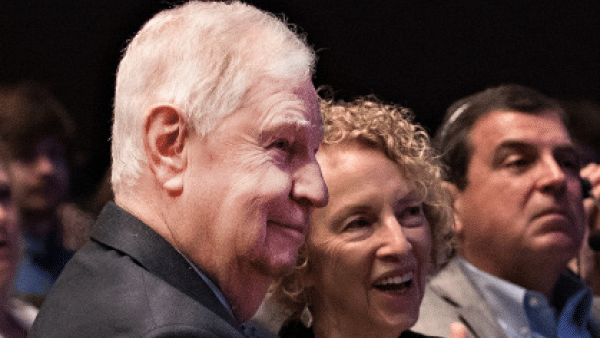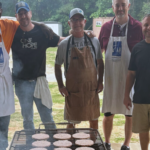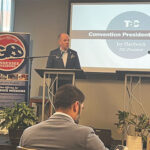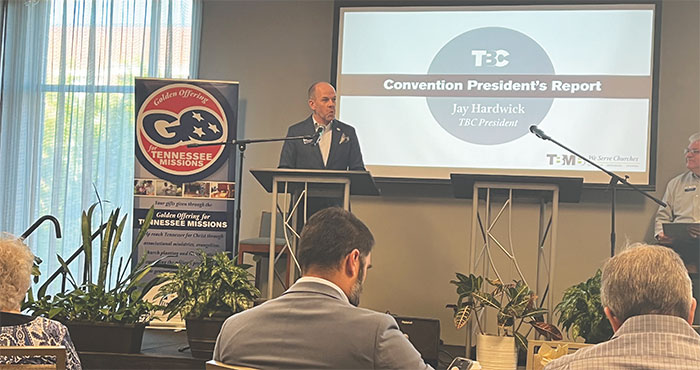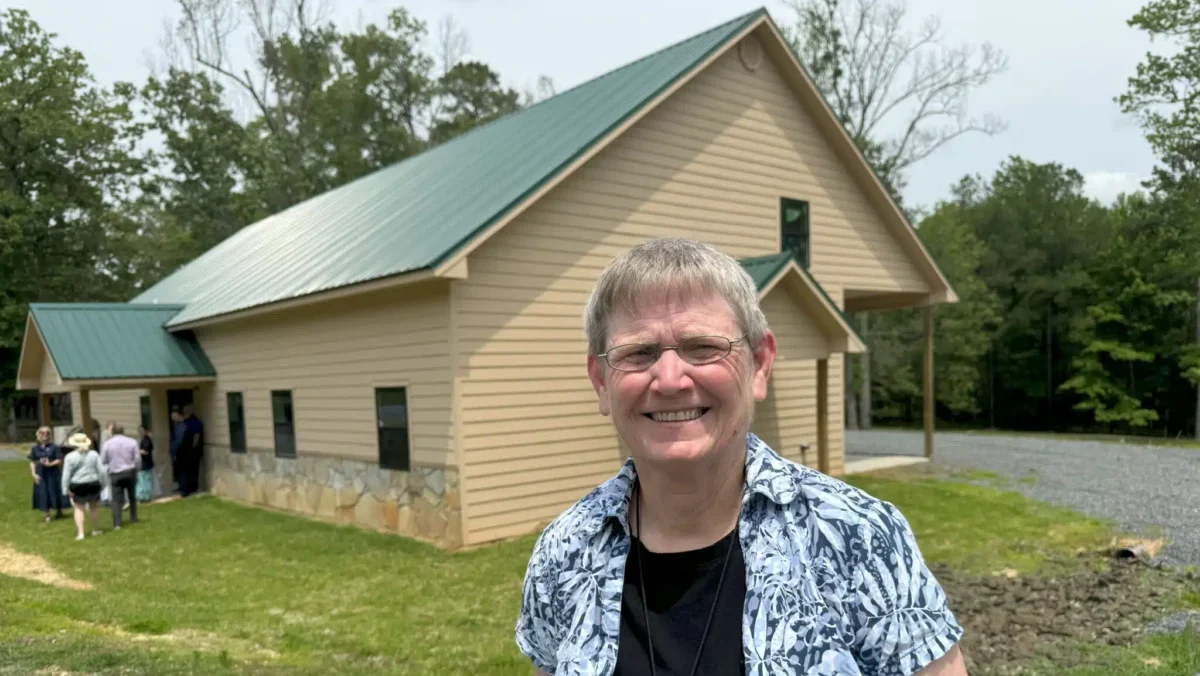The lights went down in the Georgia Dome and hushed the crowd. More than 20,000 were in attendance for the Southern Baptist Convention in June 1995. Out of the darkness, the lights beamed behind a lone figure on the platform. The crowd gasped.
It was Henry Blackaby. We had not been expecting him.
Rarely is there a gasp-worthy moment in Southern Baptist life anymore, but that was one as I recall it. As a pastor in New Orleans, I had just led my first study group through Blackaby’s “Experiencing God.” For our little clutch of eight, it was life changing — as it would be for successive groups and our whole congregation as we sought God’s will for a changing church in a changing community.
Week-by-week, we listened as Henry unfolded his little Canadian church story on video. He taught how God led Moses and Moses followed. He talked about the work of the Holy Spirit, both in Scripture and in his own experience. He told how God led and Henry’s people followed, as the Lord did amazing things among many churches in the middle of nowhere Canada.
Henry and the believers in Saskatoon really experienced God. And so did our church miles and years away.
What Henry Blackaby and his co-author Claude King did for Southern Baptists was to open our eyes to the work of the Spirit in ways that Baptists didn’t often discuss.
He called us as a denomination to deeper spiritual life, after decades buried in growth methods and doctrinal arguments.
At the pew level, he caused us to expect God to speak, and he required us to listen. And follow.
When we hear from God, we must obey immediately, he explained. It’s not a time to ponder obedience.
At least eight million people studied “Experiencing God,” based on sales of the Lifeway study book. And Blackaby became a leader for prayer at the denominational level. We needed that.
We still do.
News in February that Blackaby had died at age 88 was great for him there, but sad for us here. It was one of those times we ask again, “Who’s gonna fill their shoes?” Specifically, who’s going to step up — or should we say, kneel down — and bring us all to a place of prayer.
With all the issues facing Southern Baptists right now, and confronted by believers in every walk and witness of life, we need another Blackaby who will call us to listen for the voice of God, to give up our own machinations, to seek divine direction afresh, and to obey.
As Blackaby said, and so many of us have quoted since, we need to determine where God is working and join him there.
Thank you, Henry, for pointing the way — thus far.
EDITOR’S NOTE — This story was originally published by the Illinois Baptist.
“God has called us to run the race He’s set before us without any promise of winning that race in earthly terms.
“You will have setbacks, falls and toil — but God is there the entire time to keep you strong in the race He’s given you.
“Whatever comes your way today — run.”
Daniel Ritchie
@DanielRitchie on X
“We are saved by God from God through God to God for God.”
Jared C. Wilson
@jaredcwilson on X
“Evangelism is a conversation between two people who are nervous.
“Do you want to share the gospel? Getting to the gospel in our conversations has a lot more to do with ‘want to’ than ‘how.’ We can [always] talk about the things we want to talk about.”
Matt Queen
Pastor of Friendly Avenue Baptist Church in Greensboro, North Carolina, and former evangelism professor at Southwestern Baptist Theological Seminary
“There’s beauty in our weakness. That’s all over Scripture. I don’t know why so many of us feel that we have to have it all together. God uses us in spite of that,” said Julie Busler, an author, speaker, Bible teacher and mental health advocate. “For me, it’s worth it to feel awkward.” In her book, “Joyful Sorrow: Breaking Through the Darkness of Mental Illness,” Busler shares about her struggle with depression and undiagnosed trauma.
“I was almost killed so many times,” said Manith Sanchez, a Cambodian refugee who fled Pol Pot’s brutal dictatorship in the late 1970s. She is now a member of First Baptist Church Middleburg, Florida. “Anything could have happened to me, but for some reason God prepared my way.”
“I still remember banging away on the piano when I was really young,” said Christian singer/songwriter David Crowder. “When my mom signed me up for lessons, I kicked and screamed the whole time. But in retrospect, I’m glad that I took those lessons. I picked up the guitar in college and couldn’t put it down.”
“Through this, God has really given me a greater sense of His love for the Church, and He compels me to love her as He loves the Church. … And that’s amazing to me, how much God loves us,” said Grady Caldwell Jr., who shares the challenges of being a pastor and caregiver to his wife Kathleen, who is in the late stages of Alzheimer’s. Caldwell is senior pastor of New Mercy Baptist Church in Griffin, Georgia.
EDITOR’S NOTE — Recently an anonymous post on a social media site for associational mission strategists/directors of missions asked participants about sponsoring missions trips. Should these only be done by churches, or should the associational organization also sponsor trips? The Baptist Paper ran an article about this titled “What is the role?” in the March 28 edition.
I respectfully disagree with this article. One size does not fit all. In associations with a large number of normative size SBC churches, the majority of pastors are bivocational. It is difficult for them to make connections with missionaries and to have time to plan these trips. Yet, they often have many members who would like to experience hands-on missions experiences.
The local association can provide an invaluable service in two specific ways: 1. Connect churches with others that are able to go on missions trips so their members can serve together, and 2. Form missions partnerships, handle the travel and housing arrangements and form teams from multiple churches in the association.
Our association entered a five-year partnership with an association in Alaska at the request of our State Board of Missions. We are able to assist multiple churches in Alaska through forming teams made up of members from multiple churches. We are in no way taking the place of the church. We are supporting the idea of cooperation that the SBC has long been known for: Together we can do more.
With 75% of our churches having pastors who are bivocational or covocational, their members might not be able to have these missions experiences if the association were not serving as the catalyst to build the partnerships and assisting with the administration of the trips. We exist to serve the churches and provide resources and assistance. That is exactly what we do when we plan missions trips as a service to the churches in the association.
As we look ahead in ministry, it appears that more churches will have bivocational or covocational staff.
What a blessing to have missions-minded churches who are willing to cooperate by allowing the association to serve by providing missions trip opportunities.
The IMB and NAMB in recent years have recognized the importance of building connections with the associations. But they do not have adequate staff to train churches throughout the SBC in how to prepare for these missions trips. And many conferences and training events are simply not workable for ministers who are not full-time employees of the church. As an AMS/DOM, I am able to attend training and then meet with local pastors and churches to pass along information.
Perhaps ideally it would be best for individual churches to lead their own missions trips. But realistically, if these “normative” size churches want to offer missions trip experiences for their members, then the local association offers a tremendous resource by taking the time to plan these trips.
Danny Courson
Director of missions
St. Clair Baptist Association
Ashville, Alabama


